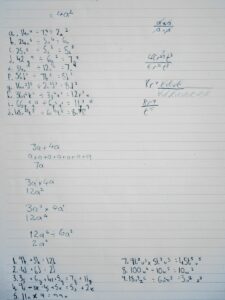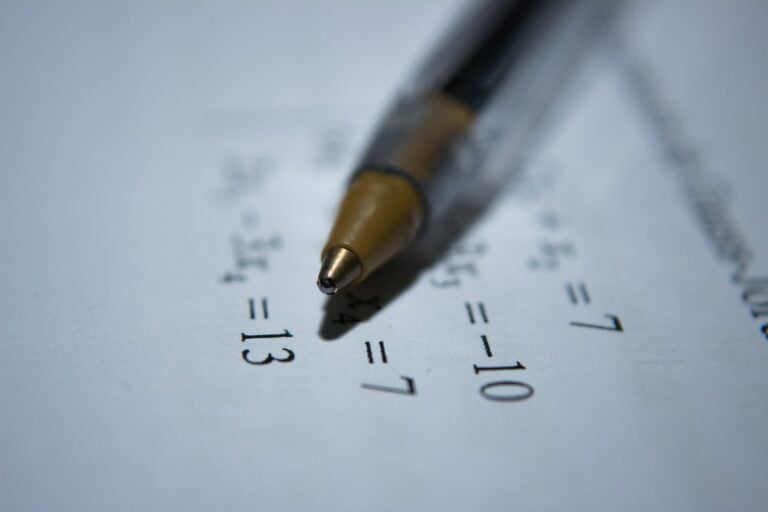“What kind of math questions are on the GED test?” is a common query among individuals preparing to take the General Educational Development (GED) test. The GED test is designed to assess the knowledge and skills of candidates in various academic subjects, including mathematics. It serves as an alternative pathway for individuals who did not complete their high school education but seek to attain a high school equivalency diploma.
In this article, we will focus on the math portion of the GED test and explore the different types of math questions that are included on the exam. The GED math test measures the mathematical knowledge and skills that are typically acquired in high school and is designed to assess an individual’s ability to apply mathematical concepts and skills in real-world situations. Whether you are a student preparing to take the GED or an adult looking to obtain your high school equivalency diploma, it is important to understand the types of math questions that you may encounter on the test.
What Kind of Math Questions Are on the Ged Test
The GED math test is designed to assess the mathematical knowledge and skills of individuals who did not complete high school. The test covers a range of mathematical topics, including arithmetic, algebra, geometry, and data analysis, statistics, and probability. The questions are designed to assess an individual’s ability to apply mathematical concepts and skills to real-world situations.
The GED math test is comprised of two parts: Part 1 is a multiple-choice test that includes questions that are based on mathematical concepts and skills, as well as questions that require the use of mathematical reasoning and problem-solving skills. Part 2 is an essay section that requires individuals to write about mathematical concepts and to apply their mathematical skills to real-world situations.

Overall, the GED math test is designed to assess an individual’s ability to understand mathematical concepts, to apply mathematical skills and reasoning to real-world situations, and to communicate their understanding of mathematical concepts through writing. Whether you are a student preparing to take the GED or an adult looking to obtain your high school equivalency diploma, it is important to understand the types of math questions that you may encounter on the test and to be familiar with the mathematical concepts and skills that will be tested.
Types of Math Questions on the GED
The GED math test covers a range of mathematical topics, including arithmetic, algebra, geometry, and data analysis, statistics, and probability. In this section, we will explore each of these topics in more detail.
a. Arithmetic: Arithmetic questions on the GED test will assess an individual’s ability to perform basic mathematical operations, such as addition, subtraction, multiplication, and division, as well as their understanding of decimals, fractions, and percentages.
b. Algebra: Algebra questions on the GED test will assess an individual’s understanding of basic algebraic concepts, such as solving linear equations and graphing linear functions. The questions may also involve the use of algebraic expressions and the manipulation of polynomials.

c. Geometry: Geometry questions on the GED test will assess an individual’s understanding of basic geometric concepts, such as lines, angles, and polyggon properties, as well as their ability to perform geometric calculations, such as finding the area of a triangle.
d. Data Analysis, Statistics, and Probability: Data analysis, statistics, and probability questions on the GED test will assess an individual’s ability to analyze data, to understand basic statistical concepts, such as mean, median, and mode, and to apply the principles of probability. The questions may involve the use of tables, graphs, and charts to represent data.
These are the main topics that you can expect to see on the GED math test. It is important to be familiar with the mathematical concepts and skills within each topic, as well as to understand how to apply these concepts and skills to real-world situations. Whether you are a student preparing to take the GED or an adult looking to obtain your high school equivalency diploma, it is important to prepare for the math portion of the test by practicing the types of questions that you may encounter on the exam.
Key Concepts Tested in GED Math Questions
The GED math test is designed to assess an individual’s understanding of mathematical concepts and their ability to apply mathematical skills and reasoning to real-world situations. Some of the key concepts that are tested in GED math questions include:
- Numerical operations: The ability to perform basic mathematical operations, such as addition, subtraction, multiplication, and division, as well as an understanding of decimals, fractions, and percentages.
- Algebraic expressions and equations: The ability to manipulate algebraic expressions and solve linear equations.
- Geometric concepts: An understanding of basic geometric concepts, such as lines, angles, and polygon properties, as well as the ability to perform geometric calculations, such as finding the area of a triangle.
- Data analysis and statistics: The ability to analyze data, understand basic statistical concepts, such as mean, median, and mode, and apply the principles of probability.

What Kind of Math Questions Are on the Ged Test - Problem-solving and mathematical reasoning: The ability to apply mathematical skills and reasoning to real-world situations, such as interpreting mathematical information presented in graphs and charts, and solving mathematical problems.
It is important to understand these key concepts and to be familiar with how they may be tested on the GED math test. Whether you are a student preparing to take the GED or an adult looking to obtain your high school equivalency diploma, it is important to prepare for the math portion of the test by practicing the types of questions that you may encounter on the exam. This will help you to develop the skills and confidence that you need to succeed on the test.
Preparing for the GED Math Test
Whether you are a student preparing to take the GED or an adult looking to obtain your high school equivalency diploma, it is important to prepare for the math portion of the test. The following are some tips to help you prepare for the GED math test:
- Familiarize yourself with the test format: It is important to understand the types of questions that you may encounter on the GED math test, as well as the format of the test. This will help you to feel more confident and prepared when you take the test.
- Study mathematical concepts and skills: Review the key mathematical concepts and skills that will be tested on the GED, such as arithmetic, algebra, geometry, data analysis, statistics, and probability. Make sure you have a solid understanding of these concepts and are able to apply them to real-world situations.
- Practice solving math problems: Practice solving a variety of math problems to develop your problem-solving skills and to build your confidence. You can find practice problems in a variety of resources, including textbooks, study guides, and online practice tests.
- Time management: The GED math test is timed, so it is important to manage your time effectively during the test. Make sure to budget your time wisely and to allow yourself enough time to solve each question.
- Reduce test anxiety: Test anxiety can be a major barrier to success on the GED math test. To reduce test anxiety, it is important to prepare well in advance, to get a good night’s sleep before the test, and to relax and take deep breaths during the test.
By following these tips and practicing the types of questions that you may encounter on the GED math test, you can increase your chances of success on the exam and achieve your goal of obtaining your high school equivalency diploma.
Strategies for Effective GED Math Test Preparation
Preparing for the GED math test requires a strategic approach to ensure success. One effective strategy is to focus on targeted practice questions that mirror the format and difficulty level of the actual test. Seek out practice materials that cover a variety of math topics, including arithmetic, algebra, geometry, and data analysis. This targeted practice will not only help you familiarize yourself with the types of questions you’ll encounter but also allow you to identify your strengths and weaknesses within each math category. Consider setting aside dedicated study sessions for specific topics to deepen your understanding and enhance your problem-solving skills.
In addition to practicing with sample questions, familiarize yourself with the specific formulas and equations that may be crucial during the GED math test. Understanding the formulas related to geometry, algebraic expressions, and statistical calculations can significantly boost your confidence and efficiency during the exam. Create a formula sheet or flashcards to review regularly, reinforcing your ability to recall and apply these essential mathematical tools. Integrating this focused practice and formula review into your study routine will contribute to a more comprehensive and targeted preparation for the GED math test.
Mastering Problem Questions: A Key to GED Math Success
The GED math test often includes problem-solving questions that require a practical application of mathematical concepts. Mastering this aspect is crucial for success. When tackling problem questions, focus not only on the mathematical operations but also on the interpretation of information provided. Develop a systematic approach to analyze the given data and choose the most appropriate method to solve the problem efficiently. This approach involves breaking down complex scenarios into manageable steps, ensuring a clear and logical progression towards the solution.
To enhance your problem-solving skills, practice working through real-world scenarios that might be presented in the GED math test. Look for questions that involve interpreting graphs, charts, or tables, and apply mathematical reasoning to derive solutions. Additionally, explore different problem-solving strategies, such as working backward or identifying patterns within the data. By mastering the art of problem-solving, you’ll not only be better equipped for the GED math test but also gain valuable skills applicable to various academic and real-life situations.
Navigating the Essay Section: GED Math in Written Form
While the GED math test primarily consists of multiple-choice questions, the essay section plays a vital role in evaluating your ability to articulate mathematical concepts in written form. When approaching the essay portion, practice expressing your mathematical reasoning clearly and coherently. Develop the skill of explaining your problem-solving process step by step, ensuring that your written responses demonstrate a deep understanding of the underlying mathematical principles.
To prepare for the essay section, consider incorporating written explanations into your practice routine for sample problems. Focus on communicating not just the final answer but also the logical steps you took to arrive at that solution. This practice will not only refine your ability to convey mathematical ideas in writing but also enhance your overall comprehension of the subject matter. Remember, the essay section is an opportunity to showcase your understanding of math beyond numerical calculations, making it a valuable component of your GED math test preparation.
The Evolution of GED Testing: Embracing Online Platforms
In recent years, the GED testing landscape has undergone a transformative shift with the integration of online testing options. This evolution provides candidates with more flexibility in scheduling and taking the GED test. The online format allows individuals to complete the GED math test in the comfort of their homes or at designated testing centers. This move toward online testing aligns with the increasing digitalization of education and assessment methods, offering a more accessible and convenient way for candidates to demonstrate their mathematical proficiency.
The online GED math test maintains the same rigorous standards as its traditional counterpart. Candidates navigate through the test’s sections using user-friendly interfaces, answering questions that cover arithmetic, algebra, geometry, and data analysis. The transition to online testing not only accommodates diverse learning styles but also addresses the evolving needs of the test-takers. As technology continues to play a pivotal role in education, the online GED math test reflects a commitment to providing a contemporary and adaptable assessment platform for individuals seeking their high school equivalency diploma.
Exploring More Resources for GED Math Preparation
In the quest for success on the GED math test, candidates now have access to a wealth of online resources that offer additional support and practice opportunities. Online platforms provide a dynamic space for interactive lessons, video tutorials, and practice questions that cater to various learning preferences. These resources go beyond traditional study materials, offering a more engaging and immersive learning experience for individuals preparing for the GED math test.
Moreover, many online platforms feature diagnostic assessments that help identify specific areas of strength and weakness. This personalized approach allows candidates to tailor their study plans, focusing on the areas that require more attention. The convenience of accessing these resources from anywhere with an internet connection empowers individuals to integrate GED math preparation seamlessly into their daily routines. As the educational landscape continues to embrace digital advancements, the availability of diverse online resources adds a valuable dimension to GED math test preparation, offering candidates a comprehensive and adaptable toolkit for success.
